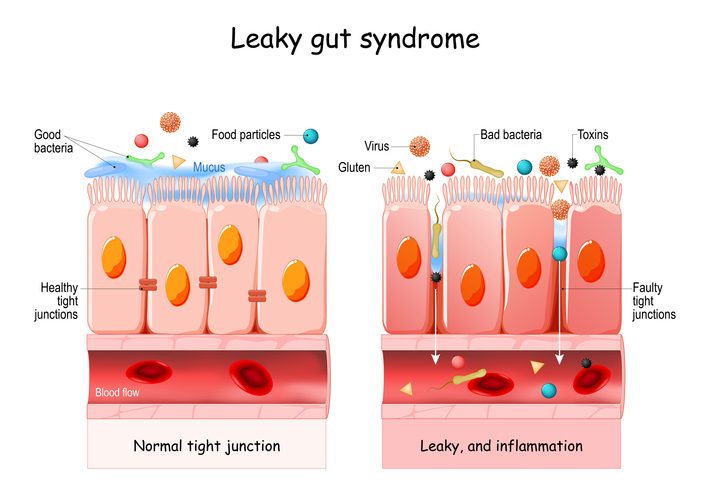Intestinal permeability is what you will find if you want to do research on this topic, but more well known as Leaky Gut.
What is Leaky Gut?
We are born with a leaky gut – gaps in the intestinal wall (tight junctions) to allow nutrition through into our bloodstream, but as we grow these tight junctions should close up as a selective protective barrier. The tight junctions are usually closed by around 1 month of age. They selectively let though nutrients, but keep out other nasties like toxins, food particles and bacteria from entering our blood stream.
The small intestine is the main location of where the barrier can become vulnerable.

Leaky gut Syndrome. difference between Healthy cells, and inflamed intestinal cells. Comparison normal tissue of the gastrointestinal tract, and leaky gut.
There is a “normal” degree of permeability in people.
What is concerning is when there is an abnormal or prolonged permeability as this can result in many gastrointestinal symptoms as well as systemic conditions including:
- Autoimmune conditions
- Coeliac disease
- Inflammatory bowel disease
- Frequent infections
- Food allergy/food intolerances
- Hypersensitivity conditions
What symptoms would I expect if I have Leaky Gut?
You don’t need to tick every example on this list. Just one could indicate Leaky Gut:
- Digestive issues – bloating, diarrhoea, constipation
- Headaches
- Joint aches, stiffness and pain
- Fatigue
- Difficulty concentrating
- Mood imbalances – depression/anxiety
- Frequent colds and infections
- Seasonal allergies
- Eczema, acne, skin rashes.
What can cause Leaky Gut?
- SIBO (small intestinal bacteria overgrowth)
- Intestinal Candida or other fungal infections
- Food poisoning
- Gluten, dairy and other inflammatory foods
- Chronic stress – emotional or physical
- Traumatic brain injury or concussion
- Pesticides and other chemicals
- Certain medications including antibiotics and non-steroidal anti-inflammatories
- Caesarean birth (baby isn’t exposed to helpful vaginal flora)
- Radiation therapy
- Being underweight especially babies, children, or teenagers.
Can Leaky Gut heal?
Yes, it can.
What can help heal Leaky Gut?
Certain foods, herbs and nutrients can help seal Leaky Gut by repairing the tight junctions, meanwhile taking out the inflammation that can be involved.
Some examples of these include:
- Glutamine and other amino acids
- Zinc Carnosine
- Slippery Elm
- Collagen
- Aloe vera juice
- Arabinogalactan
- Certain probiotics
Also avoiding some of the causing factors such as certain foods, medications, toxins is crucial. Addressing any fungal or bacterial overgrowth will also ensure the tight junctions stay repaired.
How long will it take to repair Leaky Gut?
It can take months depending on how much damage has been done. It also depends how old you are. Children can have Leaky Gut and can heal this quite well. Patience can be required to heal Leaky Gut.
I see signs of Leaky Gut quite frequently in my clinic as I work with digestive issues, eczema and other skin issues and do work with food allergies/food sensitivities. Most of these things are a good sign that there are Leaky Gut issues. There are some tests that can also indicated if the barrier is permeable.
Contact me to book in an appointment to discuss gut issues, skin issues or suspected food intolerances/allergies to ensure you can successfully heal your leaky gut or if you would like to do further functional testing. – megan@balancingnutrition.com.au or 0417 679 287.
Megan Crockart is a qualified Holistic Nutritionist & a self-confessed foodie! Megan has a special interest in working with individuals with allergies, food intolerances, SIBO, eczema, pre- & post-natal health & children’s health.
References available upon request

